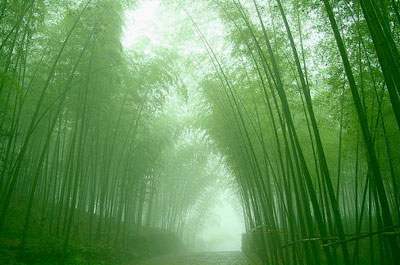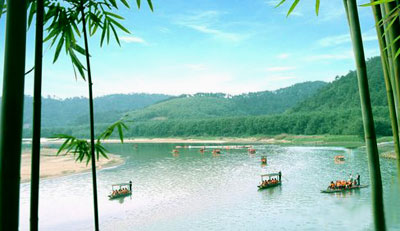| Tools: Save | Print | E-mail | Most Read |
| Bamboo Mountains Seas and Shoots |
| Adjust font size: |
Early spring is the time to taste fresh bamboo shoots in Anji, a town dominated by bamboo forests in western
A Tang dynasty (618-907) poem says, "You went to Su Dongpo, a renowned Song dynasty (960-1279) poet, said, "We could eat without meat, but couldn't live away from bamboo." In fact, bamboo is the symbol of Chinese cule, referring to a pure spirit. Years ago, that poem led my classmates and I, all Chinese literature majors, to the Anji bamboo forest to experience a life far from noise, without computers and air-conditioners. Today, I still remember those days in the bamboo forest and hope to return again one day. How to get there Anji is 73 kilometers from Anji bamboo forest (Dazhuhai) Anji was a small town built during the Eastern Han Dynasty (185) with a history spanning 1,800 years. The name of the town means "peace and luck.Before going there, we were worried about whether or not it could live up to the images we saw in Crouching Tiger, Hidden Dragon. As our bus reached the mountain, were were astonished by the scenery. Bamboo was everywhere! The forest covers 60,000 hectares and has been designated as an ecological area. It produces 12 million commercial bamboo poles annually, ranking first in the nation. We spent a whole day climbing the mountain and walking through the bamboo forest, the poles casting a shadow over us. The wind whispered through the bamboo. It was such a wonderful experience that every time I pull out my pictures, I'm instantly transported back to that moment in the thicket. I can even hear the whispering.Bamboo sprouts were plucked and cooked by the peasants all the way up the mountain. Usually, the bamboo was freshly picked and boiled in a soup. There were no set places that sold it - you could only find the soup by its fragrance, cooked by women with boilers out in the forest.If that's not enough, you can head to the foot of the mountain fo a bamboo banquet in a local restaurant. Nearly everything there was made from bamboo - from bamboo duck soup to dried bamboo shoots. The mountain also yields a lot of hickory nuts, which are difficult to find in other parts of Of the family hotels in Anji, I recommend Shunfeng Shanzhuang, owned by Gu Shiyi. His rooms with two beds cost 50 yuan per day, with a 24-hour supply of hot water. You can see bamboo trees as soon as you pull open the door. Call the hotel at 0572-511 2315 or 138-192-660-36.
Canglong waterfall Our next stop was the Canglong waterfall (Canglongbaipu), which is famous for its hundreds of waterfalls, the largest of which is 60 meters. The falls are located in Tianhuangping, a small town in southeast Anji. Buses head there from the Anji bus station every day. Many valleys and rivers can be found there, which has earned it the nickname of "Jiu Zhai Gou" in China.When we pulled up, it was still a little rainy. The hills were covered in thick clouds, but the waterfalls could still be seen from far away. Their voice was heard everywhere, and they were clearly visible from the resort on The mountain is famous for a great battle that took place there between the Qing dynasty (1644-1912) court and the Heavenly Kingdom of Great Peace (Taiping Tianguo) (1853-1864). The Taiping, aimed at overthrowing the Qing, created a new law code with many rules similar to modern A small, stockaded village could be found in the mountain with about 300 peasants. According to the locals, the village was built over 200 years ago, and many of the people who lived there were children of Hong Xiuquan, the leader of the Taiping. The Anji bamboo forest is a great place to relax, but the Canglong waterfall could test your strength. You need not only to climb the mountain to see the falls, but also to walk across some rocky bamboo bridges which hang over deep chasms. You can also take a bamboo raft down the rushing white water. Suggestions: There are two bamboo-related spots in Anji. Don't get them confused. One is th forest itself: its tickets are 20 yuan each. Another is a man-made bamboo museum (Zhuboyuan): its tickets are 75 yuan. The later contains a variety of manmade bamboo from all over (
|
| Tools: Save | Print | E-mail | Most Read |
 |
| Related Stories |
|
Product Directory China Search |
Country Search Hot Buys |

